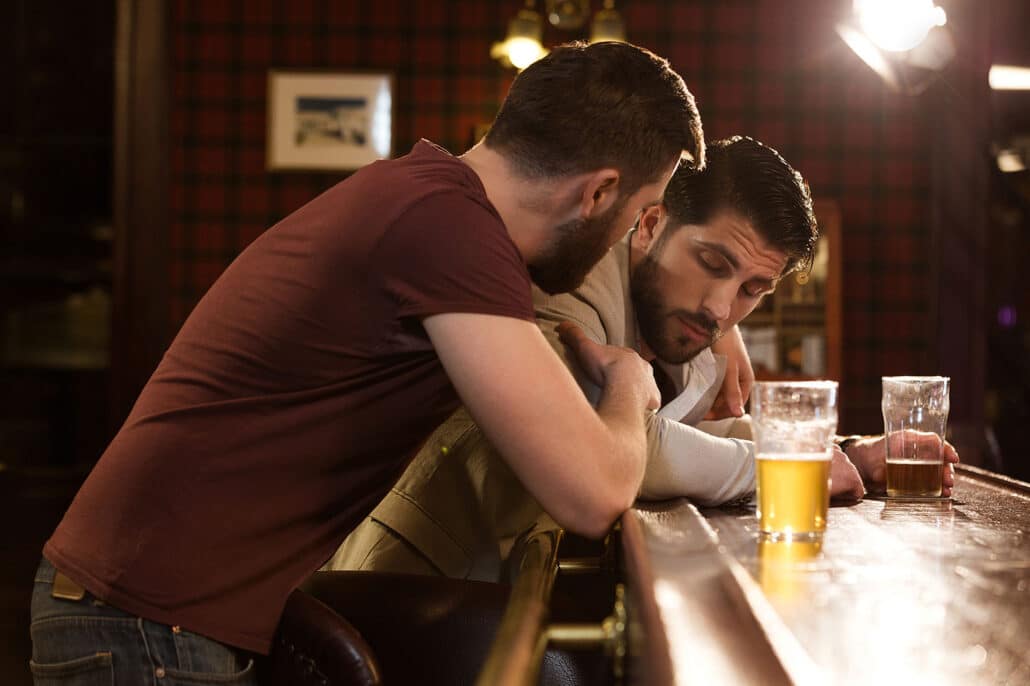One of the many possible consequences of getting drunk is saying things that are hurtful or humiliating.
Drunk people may hurl insults at their family, friends, or romantic partner. They may crack unflattering jokes about their boss or make a pass at a colleague. Sometimes, they blurt out secrets or rant about an entire group of people.

In the aftermath of such behavior, it’s tempting to make excuses and place all the blame on the alcohol. But these excuses prevent people from taking responsibility for their heavy drinking and the effects of drunk words.
Table of Contents
How Does Alcohol Affect Personality?
The day after a humiliating incident at a party or at a bar, a person who drank too much will often say, “That wasn’t really me. That was the drink talking.”
Similar excuses may come from their loved ones. “They aren’t really like that. They don’t even know what they’re saying.”
People cling to the idea that there’s an authentic self separate from the drunken persona. But there isn’t any evidence to suggest such a stark separation.
Alcohol, of course, affects behavior, including speech. When drinking heavily, people are more likely to:
- Show certain qualities associated with extraversion, such as gregariousness and assertiveness.
- Behave aggressively, especially in response to a perceived provocation.
- Experience lowered inhibitions.
- Care less about the consequences of various behaviors, including harmful speech.
- Exhibit poor judgment and a deficiency in reasoning abilities.
Even though alcohol affects behavior, it’s essential to remember that people still show an individual response to intoxication. From one person to another, there’s a lot of variation.
Some people stay quiet when they’re drunk, and maybe they fall asleep on the couch. Others crack jokes and laugh more, or they burst into tears. And some behave belligerently.
When people become drunk, they don’t develop an entirely new personality. They don’t become a whole other person. Even if some of their behavioral tendencies become more pronounced, they’re still themselves, albeit intoxicated.
You see emotions or aspects of their character that they ordinarily suppress or keep under better control. Anger, bitterness, sorrow, and even tenderness or nostalgia are powerful feelings that may emerge. Maybe they’re not even aware of the strength of their feelings. But their emotions are a part of them.
Loss of inhibition and impaired judgment make it less likely that they’ll hold back on damaging speech. When drunk, they don’t ask themselves if what they’re saying is fair, kind, or entirely truthful, and they don’t particularly care about how others will react. It may even give them temporary satisfaction to say something mean or outrageous.
The next day, they may feel ashamed and defensive. They’ll probably want to create distance between themselves and the remarks they made when they were drunk. But it isn’t realistic or honest to pretend that the drunk comments came from another person.

Are Drunk People Really Telling the Truth?
If alcohol doesn’t give people an entirely new personality, does that mean drunk people reveal the truth about themselves when they speak? Do their drunk words reflect what they think when they’re sober?
The reality is complicated. Although drunk people share something about themselves through their speech, they aren’t necessarily revealing a permanent or absolute truth.
For example, let’s say you tell a drunk friend to stop drinking. In response, they may scream, “I hate you!”
Does this mean they regularly hate you? Not necessarily. Their outburst may reflect a temporary state of resentment, anger, and shame. Even if they enjoy your company at other times, they may not be able to stand the sight of you at that very moment. Or they may be trying to drive you away so they can continue to drink uninterrupted.
What about loving words? A drunken declaration of love may reflect a deep or enduring emotion. Or it may arise from a temporary surge of warmth, sociability, or attraction.
Another scenario is when a drunk person shares an opinion about your appearance, work, or something else that matters significantly to you. Because they’re speaking with fewer filters or inhibitions, what you may be hearing is their honest opinion. Does it reflect the entirety of what they think about you? Are they telling the truth, or are they saying something merely for comedic effect or to needle you?
This is a painful question to contemplate. Even if the drunk person’s opinion is incomplete or inaccurate, you may feel disrespected, humiliated, or unloved. Their comments undermine your trust in them because you wonder what they may be hiding from you. When they’re sober, are they just pretending to like you? Do they hold you in such contempt?
Dealing with a drunk person can get even more confusing when you realize that they sometimes make things up. For example, they may tell you a story that they wish were true or that they consider entertaining, but it doesn’t reflect events that happened. The fabricated story may provide insight into their thought processes, but it doesn’t reveal anything factual.
How you interpret their words depends on multiple factors, including their general behavior patterns when drunk or sober. The nature of their comments will also have an impact on your relationship. There’s a huge difference between an empty boast and a cruel personal remark.
A drunk person’s speech doesn’t necessarily tell you everything about them or your relationship with them. But it can still cause you to confront painful and confusing possibilities.

The Need for Taking Responsibility
In the aftermath of the intoxicated speech, it’s not enough for someone to claim that they didn’t mean what they said. Somehow, their words reflected their opinions or state of mind. Also, the consequences of their words may be rippling out into daily life, damaging relationships, increasing the risk of job loss, or causing other serious problems.
Instead of pretending that their drunk words have nothing to do with their sober life, people need to take responsibility for their drinking and its consequences.
If you’re ashamed of what you say when drunk, or if your words have been hurting others and causing you difficulties, it’s time to ask yourself if your drinking has become a problem. Are you able to drink more moderately? Or does your alcohol use feel spiraling out of your control?
One sign of problematic drinking is that it hurts your relationships and other areas of your life, such as work and family obligations. Drunk words may be one way in which your alcohol use is hurting you. Instead of denying the reality of these words, turn them into a wake-up call for yourself.

Seeking Help at Long Island Interventions
The long-term effects of alcohol dependence and abuse are numerous. Excessive drinking elevates the risk of liver disease, stroke, heart problems, brain damage, and various cancers. It leads to psychological problems, impaired cognitive functioning, and low quality of life.
Don’t delay in getting help for alcohol misuse. Even if you don’t think you have full-blown alcohol dependence, you can still benefit from interventions for problematic drinking. These interventions will address the problems drinking causes in your life, including the effects of drunk speech.
When you reach out to Long Island Interventions, you can expect help from highly skilled and compassionate professionals. You’ll get treated as an individual, and the interventions will be tailored to what you personally need. Along with addressing the drinking itself, you’ll work on the habits, beliefs, and emotions that feed into the problem. The result is effective and dignified care.
FAQ
Is it true that a drunk mind speaks a sober heart?
Do your true feelings come out when drunk?
Do people mean what they say when drunk?
Do drunk texts mean anything?
Published on: 2022-10-31
Updated on: 2025-04-29

